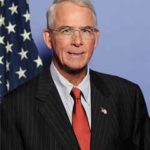Congress is making progress on SW Florida Water Quality

Congressman Rooney
The end of August will be the one-third mark for the 116th session of Congress. Despite the changeover of the House we have been able to accomplish some important things for Southwest Florida, especially dealing with our water quality and restoring the Everglades, ensuring that offshore oil and gas drilling remains barred from the Eastern Gulf and bringing federal resources to bear on the challenges presented by cyanobacteria and toxic algae blooms in our waters.
As we enter the rainy season we are hopefully better positioned to minimize polluted discharges from Lake Okeechobee into the Caloosahatchee because the lake is below 15’ depth, much lower than previous years. The Army Corps of Engineers has worked well with our delegation on this as well as committing to completing as many Everglades projects as possible with the $200 million in funding that I requested President Trump include in his annual budget.
This $200 million for 2020 spending will allow commencement of planning and design of the EAA reservoir and completion of the Picayune Strand project. Over the last two and a half years, backed by our entire Florida delegation and bipartisan House leadership, we have successfully fought for funding to complete the Hoover Dike and Comprehensive Everglades Restoration Plan. These efforts have led to the $1.1 billion for dike repairs and CERP projects in FY 2018 and FY 2019 – and commitments from
Congress, supported by the president, to fund the additional $200 million for FY 2020.
Bridging the Tamiami Trail is another important component in bringing more lake water south into the Everglades. In May I sent a letter to Secretary Elaine Chao, the Secretary of Transportation, urging that she support a pending grant application which would provide funding for the completion of the Tamiami Trail Next Steps Phase II project. This $60 million grant has recently been awarded and the bridging project will keep moving forward.
When completed, water will be able to flow south into the Everglades National Park and ultimately Florida Bay. Another priority is making the ban on offshore drilling in the Eastern Gulf permanent. The moratorium was established in 2006 and will expire in 2022 unless action is taken. In June the House
Natural Resources Committee held a markup on the Protecting and Securing Florida’s Coastline Act – my proposal to make the ban permanent. The bill was passed out of the Committee and expected to receive a vote by the full House of Representatives this summer. In addition to adversely affecting our environment and tourism economy, offshore drilling will undermine our military readiness. The Military Mission Line which the 2006 ban established, prevents offshore oil drilling east of a line which
runs due south of Destin and, as a result, creates a secure testing range for the military bases in Florida. I have also cosponsored an appropriations bill that would prohibit any funds from being expended by the Department of the Interior to conduct oil and gas pre-leasing or leasing in outer continental shelf planning areas around Florida.
We are also working on federal help for our challenge of Harmful Algal Blooms (HABs). In 2018, our community suffered devastating HABs that severely impacted our environment and economy. Unfortunately, the current federal response to HABs is not symmetrical to the response to other natural disasters, like hurricanes. After Hurricane Andrew, Florida became a leader in responding to hurricanes and that model should be followed for federal response to HABs. To mitigate damage and end these toxic blooms, I am taking action in several ways. First, I hosted a roundtable with Federal, State, and local officials, which was attended by Governor DeSantis.
I also introduced legislation to require the National Centers for Coastal Ocean Science (NCCOS), which monitor waters for HABs, to continue forecasting and monitoring, even during a government shutdown. The most recent outbreak in the Gulf lasted 16 months and generated over 2000 tons of dead sea life. During this outbreak, government shutdowns prevented NOAA’s satellites from monitoring and publishing forecasts across the nation.
Finally, I sponsored legislation to include algal blooms in the definition of a “natural disaster.” This change would position FEMA to intervene after an algae outbreak and provide disaster relief funding.
Florida’s ecology and economy will forever be linked together. We must continue to strive for clean water and a healthy environment.
Francis Rooney is the U.S. Representative for Florida’s 19th Congressional District. He is the Vice-Chairman of the House Foreign Affairs Committee and serves on the Committee on Education and the Workforce. He previously served as U.S. Ambassador to the Holy See under President George W. Bush from 2005 to 2008.



Leave a Reply
Want to join the discussion?Feel free to contribute!